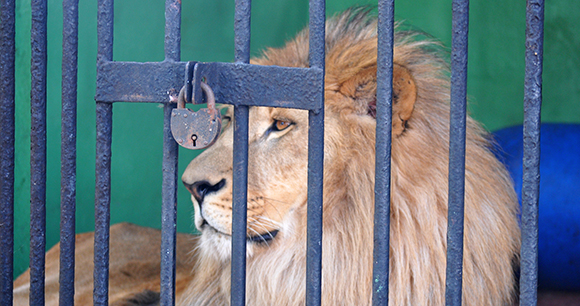
Washington, DC—In the wake of the Netflix docuseries “Tiger King” and heightened public attention to the exploitation of captive big cats, the US House of Representatives passed the Big Cat Public Safety Act today by a vote of 272-114. This bill, sponsored by Representatives Mike Quigley (D-IL) and Brian Fitzpatrick (R-PA) and endorsed by the Animal Welfare Institute (AWI), would end several abusive practices associated with keeping big cats in captivity.
First introduced in 2012, the legislation (H.R. 1380) would prohibit private individuals from possessing lions, tigers, leopards, cheetahs, jaguars, cougars, or any hybrid of these species. This prohibition would only apply to big cats kept as pets; sanctuaries, universities, and zoos would be exempt. Current big cat owners would be grandfathered in but would be required to register their animals in order to alert first responders and animal control officers that these dangerous cats are being held in their communities.
Additionally, the bill would prohibit public petting, playing with, feeding, and photo ops with cubs. The profit derived from encouraging the public to handle and pose with cubs is the primary driver of surplus tigers flooding the exotic animal trade in the United States and results in untold numbers of animals being subjected to stress and abuse.
It is estimated that thousands of big cats are currently kept in captivity across the country. Since 1990, there have been at least 400 dangerous incidents involving captive big cats in 46 states and the District of Columbia. Big cats have killed 20 adults and five children, in addition to mauling scores of others.
“We have seen the shocking news reports of a tiger being removed from a tiny apartment in Harlem, a sheriff’s department forced to shoot lions running along a highway, and a teenager killed as she posed with a tiger for a class portrait,” said Cathy Liss, president of AWI. “We have also witnessed heartbreaking footage of infant cubs pulled from their mothers to be exploited for profit, and huge tigers pacing neurotically in small, barren backyard cages. The trade in big cats is a tragedy and a national embarrassment. We commend the House for passing the Big Cat Public Safety Act and we hope the Senate will swiftly follow suit.”
“After months of the public loudly and clearly calling for Congress to end private big cat ownership, I am extremely pleased that the House has now passed the Big Cat Public Safety Act,” Quigley said. “Big cats are wild animals that simply do not belong in private homes, backyards, or shoddy roadside zoos. Too often, law enforcement and first responders are the ones who end up in danger from these animals and, in a time when our first responders are already facing increased risk from the pandemic, we owe it to them to limit the additional dangers they face on the job. Animals like tigers, lions, leopards, and pumas should not be exposed to the miserable conditions so many of them in our country currently face. By passing the Big Cat Public Safety Act we are one step closer to ensuring these animals are treated humanely and to keeping the public safe from dangerous big cats.”
“I am pleased to see the House passed our Big Cat Public Safety Act today. For too long, big cats have been mistreated, exploited, and abused in private roadside zoos,” Fitzpatrick said. “As a member of the bipartisan Congressional Animal Protection Caucus, I’m committed to ensuring our government is doing its part to promote animal welfare. It is crucial we stand up for animals, both as individuals and as a society, and our legislation takes an incredible step to protect all animals.”
Margie Fishman, (202) 446-2128, [email protected]